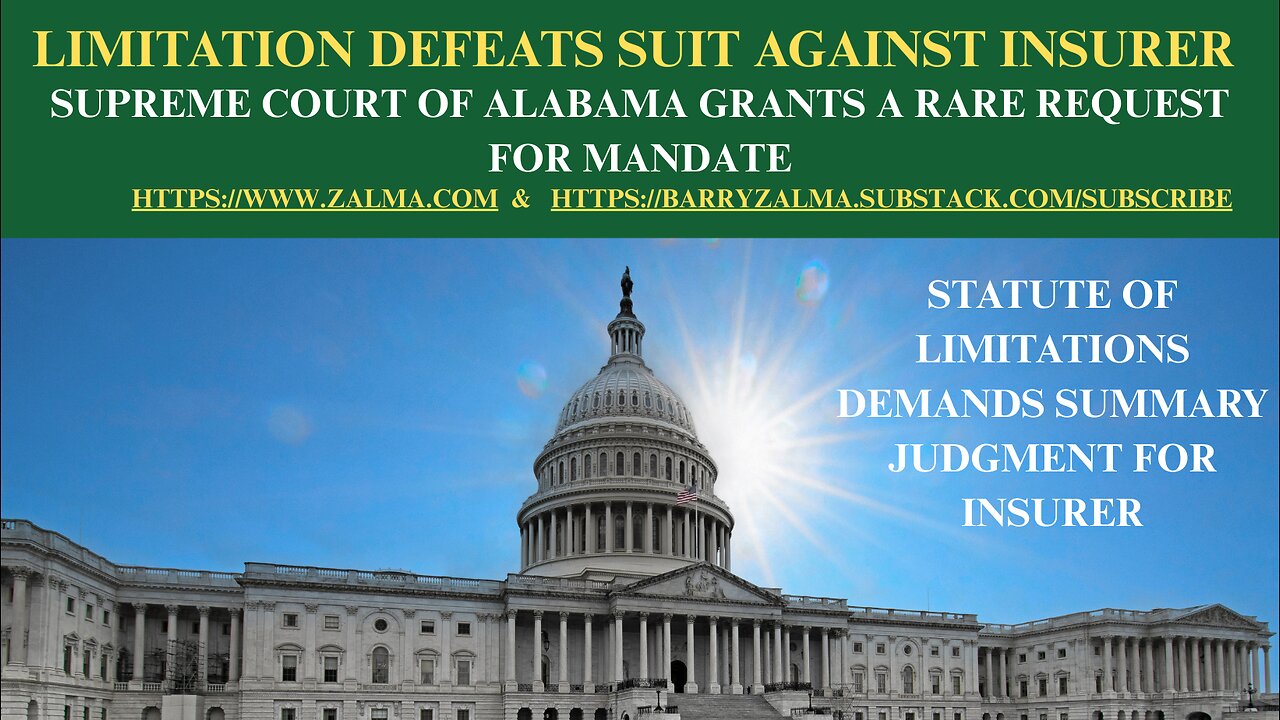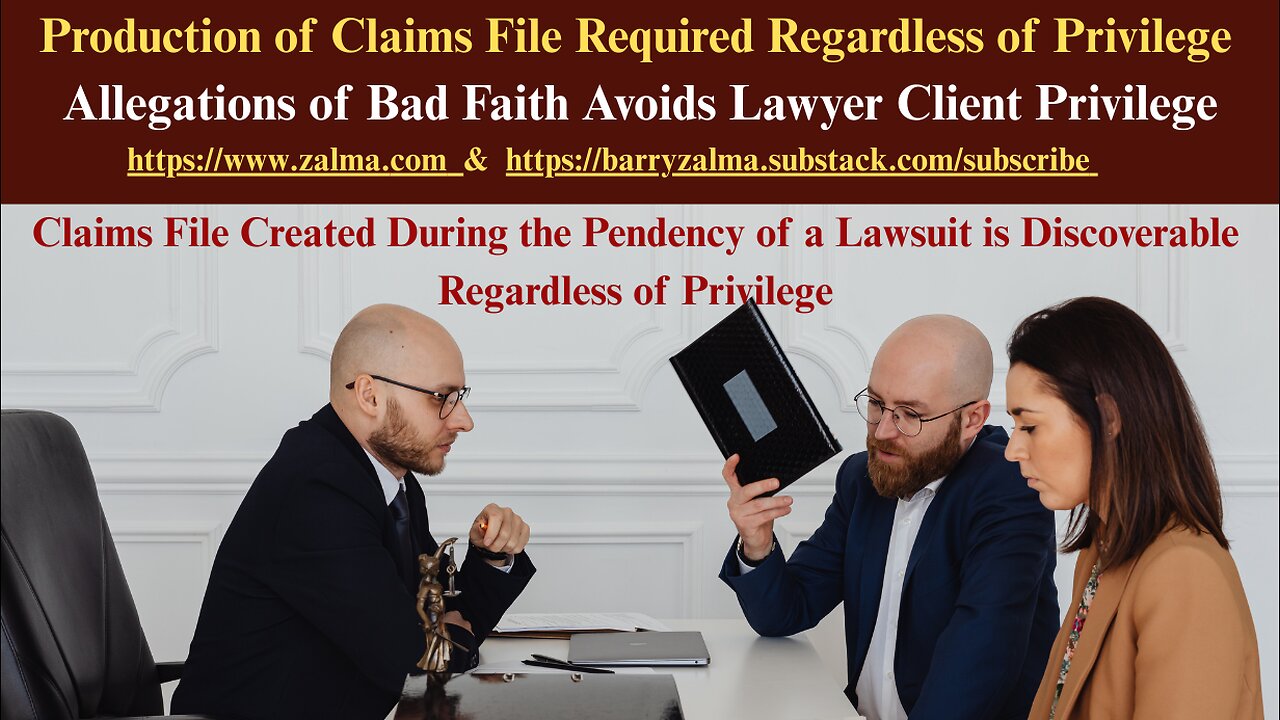
Why Insurance Fraud Succeeds
Insurers Must Be Proactive
Barry Zalma
Read the full article at https://lnkd.in/g9e-piXE, see the full video at https://lnkd.in/gTiX5KVT and at https://lnkd.in/gU9FivXq and at https://zalma.com/blog plus more than 4400 posts.
There has been much hand wringing and wailing over the malfeasance of the corporate officers and directors of FTX Crypto Exchange, Enron, WorldCom and others. No one, however, has gone to the root causes of the situation. It should be a foremost duty of the insurance industry to do whatever it can to defeat insurance fraud and work to compel prosecutors, police officers, fraud division of fraud bureau investigators, SIU investigators, and claims handlers to work to deter or defeat insurance fraud.
It is not that some corporate executives, suddenly turned to the dark side and became evil. It is not that police and prosecutors have turned to the dark side. It is, I submit, because they were all trained by the Department of Justice and local prosecutors to believe that there was almost no penalty for their crimes.
White-collar crime, especially insurance fraud, has been ignored for the last three decades as a serious crime.
A crime unpunished emboldens others who might never consider a life of crime to pursue wealth the easy way.
Prosecution of what the Coalition Against Insurance Fraud contends is a $308 billion annual insurance fraud take, the massive crime perpetrated against insurers and government “insurance” programs like Medicare are miniscule, to the point of non-existence. Fraud is rampant and almost universally unpunished.
In my 55 year career trying to defeat or deter insurance fraud I have been told by a prosecutor that the robbery of a convenience store, with a gun, where no one is hurt and $300 is stolen is more important than a $2,000,000 fraud against an insurer perpetrated by the stroke of a pen in the hands of an insurance criminal. The prosecutor refused to prosecute the insurance criminal and the insurer was compelled to defend the lawsuit filed by the fraud without any assistance from the criminal justice system.
CALIFORNIA SIU REGULATIONS
The full set of the Regulations are available at https://insurancefraud.us1.list-manage.com/track/click?u=a440c5b647697de580a2fd586&id=193011d9cb&e=5e34ee91b1
The California SIU Regulations were approved in their final form effective October 1, 2020. The SIU Regulations attempt to micromanage the work of insurance company efforts against insurance fraud and were enacted following a model act of the National Association of Insurance Commissioners (NAIC).
The California Department of Insurance (CDOI), since the first enactment of the Regulations, has audited hundreds of insurers regarding the SIU Regulations and found that most insurers doing business in California that were audited were in violation of some portion of the SIU Regulations. Major fines, as much as $10,000 per violation, may be imposed on those insurers who refuse, or fail to, comply with the SIU Regulations. Failure to train 100 employees, as an example, can result in a fine from $500,000 to $1 million.
In addition to the special assessments enacted to fund the fight against fraud, the California Department of Insurance audits insurers regularly to be sure that each insurer works hard to investigate and seek prosecution of the crime of insurance fraud in accordance with the California SIU Regulations.
Simultaneously, the same Department of Insurance punishes insurers for not paying claims rapidly or for not treating insureds or claimants fairly, many of whom are experienced insurance cheats who use the Department’s consumer unit to brow-beat insurers into paying fraudulent claims. In addition, when an insurer’s state mandated SIU accuses an insured of fraud by reporting to the California Department of Insurance or denying a claim for fraud, the insurer will invariably be sued for fraud. Courts and juries, believing the bad reputation that insurers have in the press and public, will assess punitive and exemplary damages against insurers who accuse their insured’s of fraud looking with 20/20 hindsight at the investigation.
Similar businesses in the financial sector, who are also regular victims of fraud and other crimes, are not taxed or compelled to investigate crimes committed against them. No one demands that the banking industry pay for prosecuting embezzlers or bank robbers. No one demands that convenience store operators pay for prosecuting people who hold up their stores on a daily basis. No Regulator require
s stockbrokers to investigate fraudulent transactions. The imposition upon the insurance industry – and the attendant cost passed to the insurance consumer – is unique.
Insurers are treated differently than all other businesses in the United States. George Orwell was right when, to paraphrase, what he had a character in “Animal Farm” say, “all businesses are equal, some are more equal than others.” Clearly, insurers are less equal with regard to crimes perpetrated against them than are other businesses.
The SIU Regulations set forth minimum standards. They are not intended to be a text on the handling of suspected fraudulent insurance claims that must be followed slavishly. They do not even claim to be a complete guide to handling suspected fraudulent claims or the investigation of suspected insurance fraud. The Regulations are, rather, an outline of basic claims handling techniques when dealing with a suspected insurance fraud.
Common findings of SIU compliance reviews, that insurers should attempt to avoid, include:
SIU inadequate or non-existent;
Suspected fraud not reported to District Attorneys, CDOI;
Fraud referrals (FD-1s) contain errors/omissions;
Fraud referrals submitted on outdated forms (FD-1s);
Written anti-fraud procedures inadequate;
SIU investigation procedures inadequate or non-existent;
Continuing training not received by SIU;
Anti-fraud training not provided by SIU;
Training records incomplete or non-existent;
Annual compliance report delinquent;
Annual compliance report inaccurate or incomplete; and,
Third Party Administrators (TPAs), contracted SIU's not monitored by insurer.
When an insurer is found wanting it will be fined by the CDOI and could even lose its right to do business in the state. Other states have similar statutes to the California statute and Regulations following model statutes and regulations created by the NAIC.
Do Insurers Get Their Money’s Worth From The Special Taxes Paid for Fighting Fraud?
Not really. Since what drives fraudsters to pursue this type of crime is the fact that insurers and insurance regulators are unwilling to prosecute offenders. According to insurance fraud in the U.S. statistics, only a tiny portion — not even 2% — of frauds are prosecuted. The reasons for avoiding prosecution include high trial expenses and unpredictable outcomes. But even though it might be costly and demanding, the prosecution may serve as a plausible threat and thus deter fraudsters.
What Do The Results Really Show?
Insurance fraud prosecutions and investigations are anemic. Every two weeks I publish in Zalma’s Insurance Fraud Letter, reports of convictions for insurance fraud. Most convictions appear to be about frauds directed against federal “insurance” programs like Medicare, Medicaid, Flood and Crop Insurance programs. Many of the conviction are really the result of a qui tam or whistleblower suit. The criminals are laughing at the insurance industry, the police agencies and the prosecutors. If they are one of the few criminally convicted, they face an average sentence of only five years’ probation and 60 days in jail. Jail time is usually served on weekends so that they can still ply their fraudulent trade on weekdays. Some few convictions are other than health insurance fraud pursued by the state agencies.
Fraud bureaus are not as effective as they want to be or want insurers to believe. Because Fraud Bureaus and Fraud Divisions in the various states have minimal staff. Very few of the cases referred for prosecution resulted in a conviction. Those convicted were a minimal percentage of the cases referred by insurers to the Fraud Bureaus. In California, and many other states, the law requires insurers to report suspected fraudulent claims to the Fraud Bureau. California insurers report approximately 2,000 – 3,000 suspected fraudulent claims each month. Few are investigated; fewer are reported to prosecutors for prosecution and even fewer reported to prosecutors for prosecution result in a trial or conviction.
Contrary to the belief of many prosecutors, even though people are seldom physically injured by insurance fraud, it is a major crime with a statutory maximum punishment in most of those states where it is a crime, of five years in state prison. When an insured tries fraud by an arson-for-profit it is also a violent crime that often results in injury to bystanders, firefighters, or police officers.
Specialists who know insurance and insurance fraud investigate it. It is, at least in California and those states that have a criminal insurance fraud statute, a rather simple crime to prove. It should be the type of case a prosecutor would want to file and take to trial since simply presenting a single false document to an insurer is sufficient to involve a conviction for violation of the local Insurance Frauds Prevention Act like California Penal Code Section 550. Instead, as an ex-prosecutor said to me: “insurance fraud is a crime prosecutors run away from because the cases are usually heavy with documentary evidence and are complex.” It is easy to prosecute an armed robber. A witness and a video of the robbery is all that is needed.
When the public is told that a group of criminals steals $300 billion every year from the insurance industry the response is either a cheer or a yawn.
Everyone involved in the business of insurance and everyone who buys insurance must make it clear that they are angry with what is happening to their insurance premium dollar.
(c) 2023 Barry Zalma & ClaimSchool, Inc.
Subscribe and receive videos limited to subscribers of Excellence in Claims Handling at locals.com https://lnkd.in/gfFKUaTf.
Go to substack at https://lnkd.in/gEEnV7Dd Consider subscribing to my publications at substack at https://lnkd.in/gEEnV7Dd
Barry Zalma, Esq., CFE is available at http://www.zalma.com and [email protected]
Go to Barry Zalma videos at Rumble.com at https://lnkd.in/gV9QJYH; Go to the Insurance Claims Library – https://lnkd.in/gWVSBde
Follow Mr. Zalma on Twitter at https://twitter.com/bzalma;
Subscribe and receive videos limited to subscribers of Excellence in Claims Handling at locals.com https://zalmaoninsurance.locals.com/subscribe.
Go to substack at substack.com/refer/barryzalma Consider subscribing to my publications at substack at substack.com/refer/barryzalma
Barry Zalma, Esq., CFE, is available at http://www.zalma.com and [email protected] to Mr. Zalma at [email protected]; http://www.zalma.com; http://zalma.com/blog; daily articles are published at
Zalma on Insurance
Insurance, insurance claims, insurance law, and insurance fraud .
By Barry Zalma
Go to the podcast Zalma On Insurance at https://anchor.fm/barry-zalma; Follow Mr. Zalma on Twitter at https://twitter.com/bzalma; Go to Barry Zalma videos at Rumble.com at https://rumble.com/c/c-262921; Go to Barry Zalma on YouTube- https://www.youtube.com/channel/UCysiZklEtxZsSF9DfC0Expg; Go to the Insurance Claims Library – https://zalma.com/blog/insurance-claims-library
Supreme Court of Alabama Grants a Rare Request for Mandate
Read the full article at https://www.linkedin.com/pulse/limitation-defeats-suit-against-insurer-barry-zalma-esq-cfe-eychc, see the video at and at and at https://zalma.com/blog plus more than 5250 posts.
Statute of Limitations Demands Summary Judgment for Insurer
Post number 5296
In Ex parte Alfa Mutual Insurance Company and Jeffery Dimoff, In re Kinsman Investments, LLC v. Alfa Mutual Insurance Company and Jeffery Dimoff, No. SC-2025-0478, Supreme Court of Alabama (February 27, 2026) a rare Petition for Writ of Mandamus was granted and the trial court was ordered to enter summary judgment on behalf of Alfa.
Facts
Kinsman Investments, LLC (“Kinsman”) owned an apartment complex in Mobile, Alabama, which suffered significant damage from Hurricane Katrina in August 2005. At the time, the property was insured by Alfa Mutual Insurance Company (“Alfa”). Jeffery...

Claims File Created During the Pendency of a Lawsuit is Discoverable Regardless of Privilege
Read the full article at https://www.linkedin.com/pulse/production-claims-file-required-regardless-privilege-barry-ehroc, see the video at and at and https://zalma.com/blog plus more than 5250 posts.
In Melissa Eddy, and Alexis Eddy v. Farmers Property Casualty Insurance Company, f.k.a. Metropolitan Property and Casualty Insurance Company, APPEAL NO. C-230298, Court of Appeals of Ohio, First District, Hamilton County, 239 N.E.3d 1003, 239 N.E.3d 1000, 2024-Ohio-1047 (March 22, 2024) ruled on discovery issues with regards to the privileges asserted by Farmers.
Facts
In February 2020, Melissa Eddy was injured in a car accident while her husband, Alexis Eddy, was driving. The accident was caused by another driver, Pamela Shooner. Melissa sustained neck injuries that required surgery. At the time, the Eddys held an ...

ZIFL – Volume 30 Number 5
THE SOURCE FOR THE INSURANCE FRAUD PROFESSIONAL
Read the full article at https://lnkd.in/gsD9eFea, see the full video at https://lnkd.in/gNiQ5zcw, https://lnkd.in/gnG8TAeT and at https://lnkd.in/gzjMXakw and at https://zalma.com/blog plus more than 5250 posts.
Zalma’s Insurance Fraud Letter (ZIFL) continues its 30th year of publication dedicated to those involved in reducing the effect of insurance fraud. ZIFL is published 24 times a year by ClaimSchool and is written by Barry Zalma. It is provided FREE to anyone who visits the site at http://zalma.com/zalmas-insurance-fraud-letter-2/ This issue contains the following articles about insurance fraud:
ANTI-SLAPP MOTION STOPS CRIMINAL FROM ATTEMPT TO PROTECT HIS ASSETS FROM CONFISCATION
Convicted Criminal Seeks to Compel Receiver to Protect his Assets
The Work of a Court Appointed Receiver is Constitutionally Protected
In Simon Semaan et al. v. Robert P. Mosier et al., G064385, California Court of Appeals, Fourth District, Third Division (February 6, 2026) the Court ...
Contract Breaches that Allow Multiple Different Grounds to Make a Policy Void
More from Excellence in Claims Handling Substack for Subscribers Only. You can Subscribe to my substack at https://barryzalma.substack.com/subscribe
Posted on February 24, 2026 by Barry Zalma
You’re reading from the free part of Excellence in Claims Handling until you reach the paywall. You should consider joining as a paid member to get full access to articles for members only, to our news, analysis, insurance coverage, claims, insurance fraud and insurance webinars, by clicking at the “subscribe” link below.
If an insured breaches one or more material warranties and increases the risk covered by the policy, the contract may be voided by the insurer, depending on the jurisdiction. It is, therefore, essential that every claims investigation include efforts to establish compliance with every warranty.
In Cummings v. Fire Insurance Exchange, 292 Cal. App. 3d 1407, 249 Cal. Rptr. 568 (1988), the Court of Appeal ...

Passover for Americans
Posted on February 19, 2026 by Barry Zalma
“The Passover Seder For Americans”
For more than 3,000 years Jewish fathers have told the story of the Exodus of the enslaved Jews from Egypt. Telling the story has been required of all Jewish fathers. Americans, who have lived in North America for more than 300 years have become Americans and many have lost the ability to read, write and understand the Hebrew language in which the story of Passover was first told in the Torah. Passover is one of the many holidays Jewish People celebrate to help them remember the importance of G_d in their lives. We see the animals, the oceans, the rivers, the mountains, the rain, sun, the planets, the stars, and the people and wonder how did all these wonderful things come into being. Jews believe the force we call G_d created the entire universe and everything in it. Jews feel G_d is all seeing and knowing and although we can’t see Him, He is everywhere and in everyone.We understand...
Passover for Americans
Posted on February 19, 2026 by Barry Zalma
Read the full article at https://www.linkedin.com/pulse/passover-americans-barry-zalma-esq-cfe-5vgkc.
“The Passover Seder For Americans”
For more than 3,000 years Jewish fathers have told the story of the Exodus of the enslaved Jews from Egypt. Telling the story has been required of all Jewish fathers. Americans, who have lived in North America for more than 300 years have become Americans and many have lostthe ability to read, write and understand the Hebrew language in which the story of Passover was first told in the Torah.
Passover is one of the many holidays Jewish People celebrate to help them remember the importance of G_d in their lives. We see the animals, the oceans, the rivers, the mountains, the rain, sun, the planets, the stars, and the people and ...

















